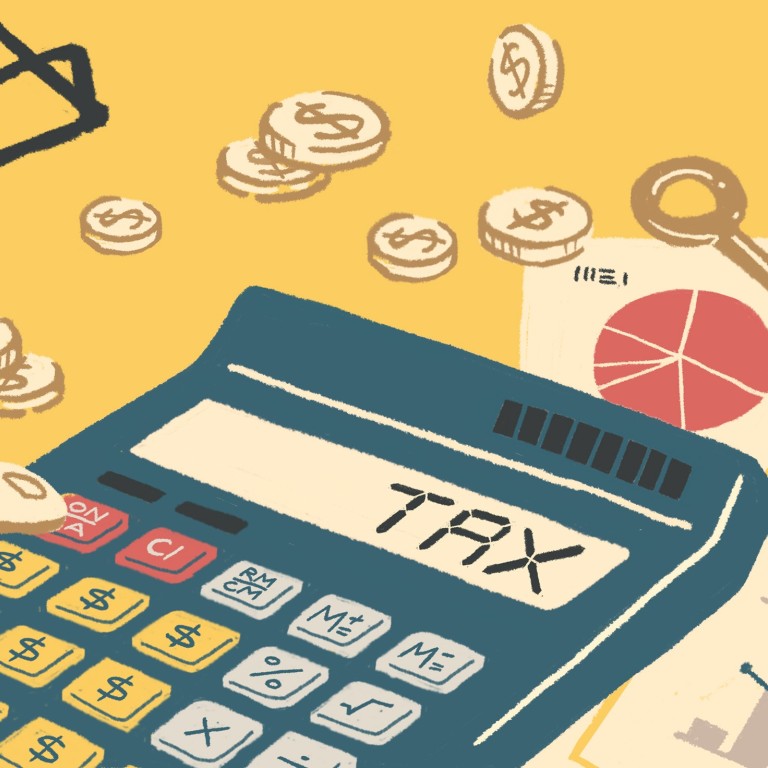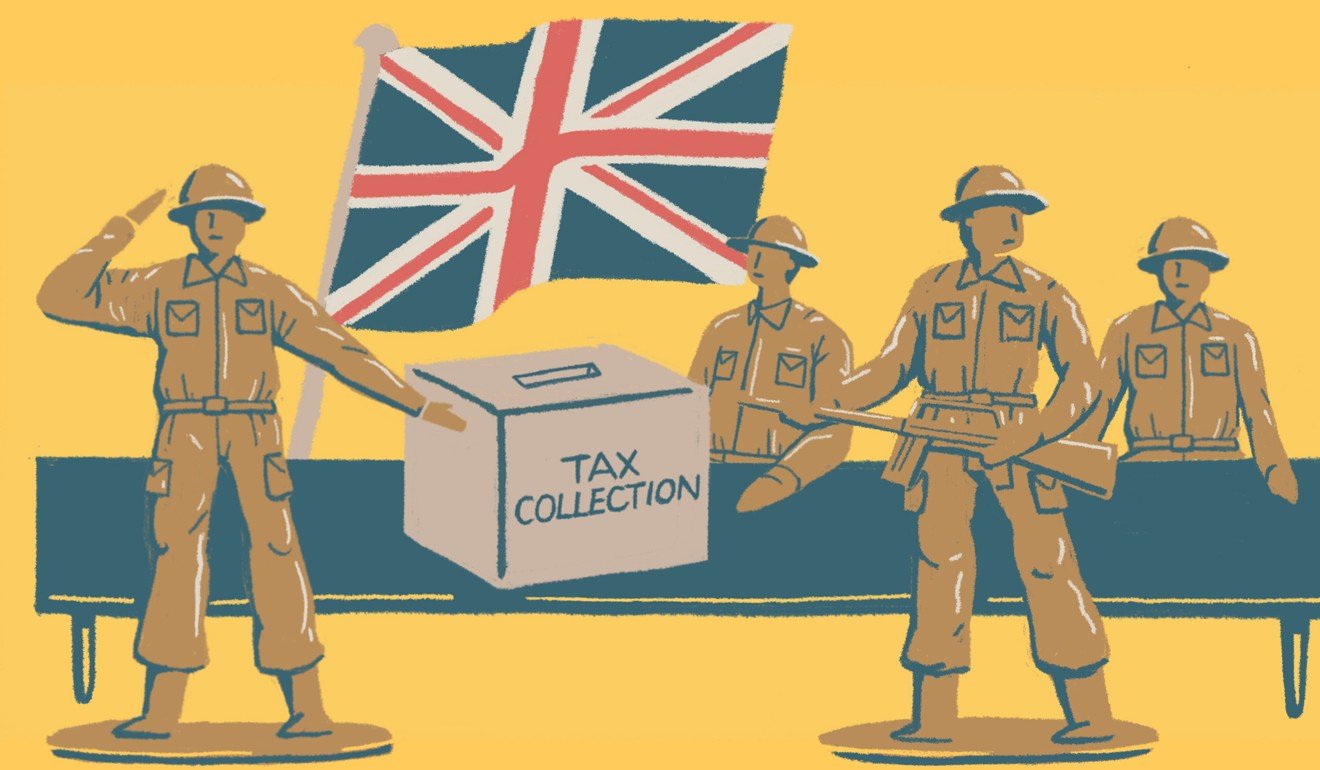
Explainer | Hong Kong’s tax system explained: why levies are so low, how it competes with Singapore, and why it’s ‘both out of date and ahead of its time’
- The pairing of low income tax and high property values has been successful for the city, but experts warn it might not last
Companies and workers in Hong Kong enjoy some of the lowest taxes in the world. This is partly because the government has huge fiscal reserves equivalent to more than 12 months of expenditure. The interest received on these reserves is a crucial source of revenue, and helps keep the tax burden light. In Taxation without Representation, a book by former Hong Kong resident Michael Littlewood, the city’s system is described as “both seriously out of date and ahead of its time”. How is this strange contradiction the case? We explore the ins and outs of Hong Kong’s unique system of taxation.
Was it always this way?
For decades, Hong Kong was famous worldwide as a tax-free port. From merchants and bankers to 19th-century opium traders, the non-existent taxation policy attracted many to the city’s shores.
However, when the second world war hit, a temporary taxation system was introduced as an emergency wartime fundraising mechanism.
Hong Kong budget 2019: six key takeaways, from tax relief to help for struggling businesses
In 1947, the Inland Revenue Ordinance was established, to solidify the wartime measures into a more permanent system. Income tax was capped at 10 per cent. This system mirrored what Britain had mapped out for its colonies worldwide. Since then Hong Kong has seen its economy flourish and transform from a colony to a modern metropolis centred on international trade and finance.

Higher rates of tax were planned for the years after the war, but two review committees, in 1954 and 1967, eventually declined to reform the system.
Change did not come until 1998, when a series of concessions were introduced on profits tax to increase the city’s competitiveness. A 2002 review committee proposed a goods and services tax, but widespread opposition led to the government revoking the plan in 2006.
For better or worse, the 1947 taxation policy remains largely unchanged to this day.
So how does Hong Kong compare with elsewhere?
Last year a report by auditor PwC and the World Bank listed Hong Kong’s tax system as the most business-friendly in the world. Qatar and the United Arab Emirates were ranked second and third out of 190 jurisdictions.

Singapore is usually Hong Kong’s biggest competitor in Asia for the title of “best place to do business”. The Lion City, unlike Hong Kong, has a goods and services tax, and also taxes foreign income remitted to the city state. But companies in Singapore pay less tax after deductions, and have access to a vast range of industry-specific tax incentives to draw investors.
Time to review Hong Kong tax system, say accountants
A decade ago Singapore began turning its three main reserves of wealth into assets the city could live off. If Hong Kong were to follow Singapore’s example by setting aside gains from stamp duty and government land sales for foreign investment, the resulting returns could help increase public spending.

In 2017 Hong Kong instituted further reforms in an effort to keep up with Singapore. Chief Executive Carrie Lam Cheng Yuet-ngor unveiled a two-tier tax system which slashed the levy on profits of up to HK$2 million (US$254,782) by 50 per cent. The change meant a business with a taxable annual income of just over HK$30 million paid the same corporation tax in both cities.
How does the system work?
When Hong Kong’s mini-constitution, the Basic Law, was drafted in 1990, two articles were introduced to protect the low tax system. According to article 108, “the Hong Kong Special Administrative Region shall practise an independent taxation system” – separate from that of mainland China.
Article 106 stipulates that Hong Kong has an independent public finance system and does not have to hand tax revenue to the central government in Beijing.

Anyone living in Hong Kong for more than 60 days is subject to personal income tax of up to 17 per cent. The ceiling for corporate tax is set at 16.5 per cent. The city has no capital gains tax, no withholding tax, no estate tax, no dividend tax, no sales tax or value-added tax, and no tax on interest. For these reasons, Hong Kong is a popular shopping destination. Tax is paid by property and land owners at a standard rate of 15 per cent of their rental income. Inheritance tax, or estate duty, was abolished in February 2006.
After shopping, travel and health, China’s digital revolution has the tax system next in its sights
In 2008 Hong Kong removed all duties on alcohol except for spirits. Former No 2 official Henry Tang Ying-yen has been pushing for a waterfront vineyard in West Kowloon, where he is now chairman of the Cultural District Authority.
Taxation in Hong Kong is proportional to income. The city’s most affluent pay the most, and low-income households are hardly taxed at all. Salaries tax is set at 2 per cent for homes earning less than HK$40,000 a year, and increases progressively to 17 per cent for those earning HK$120,000 or more.
If taxes are so low, how does the government make money?
The government has other, lucrative sources of revenue. It directly owns much of the city’s land, and sells sites to private developers only when population growth projections require it.
In the 2017-18 financial year, 27 per cent of Hong Kong’s HK$612 billion revenue came from land sales. The government also makes money by leasing land.
Hong Kong’s pairing of low income tax with high property values has been successful for the city. However, higher property values mean greater property tax, which some say is making the city less attractive. Last year former Monetary Authority chief executive Joseph Yam Chi-kwong called the city’s policy on land a de facto tax imposed upon its residents. He warned that sky-high land and property values would stunt economic development in what was already the world’s least affordable market.
Littlewood says the system’s historical success has come from concentrating the tax burden on the highest incomes while sparing the poor. However, there are doubts about whether this system can meet the demands of the 21st century. There is a strong case for the introduction of a progressive consumption tax, he says, but the idea is new and politically difficult. But Littlewood argues the system already indirectly discourages consumption by being generous in its treatment of savings, which effectively puts it ahead of its time. Ultimately, the critical factor is popular support, he believes, and the only way to determine whether Hongkongers truly approve of the tax regime is by establishing a democratic system of government.

